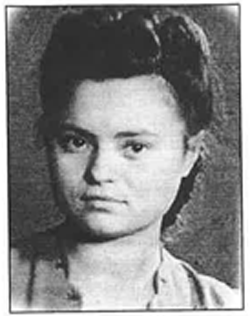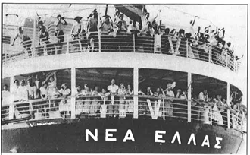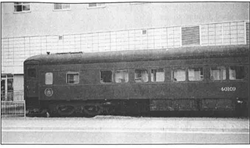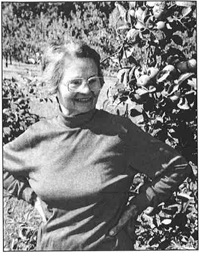Sobey Wall of Honour
Column
145
Row
11
THE TALE OF A UKRANIAN IMMIGRANT
Irene Turczyniak
I was born in Western Ukraine in 1924 in the village in Bohatkiwci. I lived there until I finished elementary school. Then, my parents enrolled me in high school in the picturesque city of Berezhany. There I attended school until 1939. September 1st, 1939 Hitler declared war on Poland. At that time Western Ukraine was under the Polish government. Hitler also made a deal with Stalin where the Soviet Union would occupy Eastern Poland and at this time Western Ukraine went into the hands of the Communists. The occupation lasted approximately two years, but the KGB managed to destroy everything that was in their path. Thousands of families were sent to Siberia and others were murdered in prisons.
In June 1941 the Germans declared war on the Soviets; however, prior to this Hitler promised Ukraine's independence. The Ukrainian anthem could be heard everywhere. Public buildings were with the blue and yellow Ukrainian flags. Ukrainians were hoping that better times has arrived, however this happiness didn't last long. Ukraine was betrayed by Hitler. During the second week of German occupation they arrested all of the Ukrainian leaders and politicians. Ukraine was occupied by Germany.
I was still attending high school. After graduation I enrolled at the University of Lviv. My major was chemistry. By January 1944 I had finished two semesters and started my third. The defeat of the German army at Stalingrad was the beginning of the end. The Soviet army was marching west again with full force. At the same time, the allied forces (Canada, the United States, France and England) were fighting the Germans from the west. By March of 1944, the front of the Soviet army was nearing our village of Bohatkiwci. My family packed whatever they could put on the horse-drawn wagon and took refuge in the west. For three months we travelled, passing villages with the sound of artillery not far behind. Thousands of refugees were travelling a similar road. In August of 1944 we reached the village of Komancza, close to the Czechoslovakian border with painful hearts were leaving our beloved Ukraine. The border was patrolled and no one could cross.
On the third day, a long, empty freight train was passing through the village and stopped at the railway station. On the train were a few German soldiers and two of our priests asked them to take us across the border. They gave us only ten minutes to board the train. We were ready in less than that. The cry of children and the prayers of many were heard in every car. Two nights and thee days we were on that train until we finally crossed into Austria. The train stopped in the city of Gratz and were transferred into labour camps. In these camps people were sorted into groups by age, education and health, and sent to various places to work. Being a university student majoring in chemistry, I was sent to work as a pharmacist's assistant in the city of Rottenman. Here I worked until the German capitulation in 1945. At that time I met my future husband Tadej. We both used to study at the same university. It was nice to have him here as my companion. After the war, our families didn't stay long in Austria. We all moved to Munich. Germany was divided into four zones; the United States, Britain, France and the Soviet Union. At that time Germany was overcrowded with refugees. The governments of the Allied Forces organized UNRA (United Nations Refugee Association) camps. All empty facilities that served during the war as the German Army's quarters were now occupied by refugees. The camp to which we were assigned was located in the beautiful town of Mittenwald. It was surrounded by the high peaks of the Alps. From that time we were under the care of the U.S. government. All our food, clothing and other needs were provided by UNRA. Any extras could be purchased on the black market.
September 1945 I entered the University of Munich. Based on my previous grades and my work experience at the pharmacy in Rottenman, I was accepted into third year of the four year Pharmacy program. Tadej was accepted into his fourth year of Civil Engineering. Life was becoming more tolerant; at least there was hope for the future. At the same time people were progressing in the camps as well. A small building was renovated into a church. Many of us had brought paintings and holy icons from home and used them to decorate our new church. My father was a teacher and was allowed to use four rooms in the building as an elementary school. A few other rooms were used for high school instruction. Among the six thousand inhabitants of this camp there were many doctors, priests, teachers, lawyers, etc., and children of all ages. Ukrainians were very resourceful, hard-working and made life in the camps as pleasant as could be expected under the circumstances.
At the beginning of 1947 we were told that immigration would begin soon. The first people who were to go were those who had relatives overseas. Tadej's father was the first one from our family to go to Canada. At this same time, Tadej and I entered our final year at university and we decided to get married. Our wedding took place on Sunday, September 21, 1947. It was witnessed by friends and family. On Monday, we returned to university and lived in Tadej's home. We worked very hard to achieve our degrees. Our plans changed however, when in the spring of 1948 we discovered that we were to become parents. Tadej and I decided that we would follow his family to Canada, while my parents and family went to the United States. Our daughter, Oksana, was born in November, 1948. We had to wait six months before we were allowed to travel with an infant.
Our journey began in May. We were transported from Mittenwald to Naples, Italy. On May 30th we were on the Greek ship New Hallas heading west on the Mediterranean. The beautiful scenery of the Italian shores is difficult to describe; only a painter can do it justice. After five days we stopped in Lisbon, Portugal to pick up more travelers. From Lisbon, the journey across the Atlantic was long and rough. In total we spent twelve days aboard the ship travelling to Canada.
On the morning of June 10th, 1949 we finally saw the shores of Canada. I will never forget the day we set our eyes on the coast of Nova Scotia. It was a luxury to even dream about it. It was a relief to hear the Captain's voice call out, "This is the end of the journey. At eight o'clock this morning we will proceed to the port of Halifax." At that moment the tiredness of the travelers disappeared, and they swarmed onto the deck of the ship. The flickering lights of the city and the shadows of the land were my first glimpses of my new home. This generous country opened its doors to thousands of immigrants. I was standing beside my husband holding my daughter in my arms; it was very quiet and everyone was looking in the same direction, looking and the land that from now on would be our home. Surrounding us were our journey companions: old, young, some married and with children, some alone and looking lonely. There were so many people of different nationalities whispering prayers in their own languages, but all with the same thoughts that I was having. I was dreaming of our future, one clean room for our little family, a bed with a new mattress, a new baby crib, plenty of milk, and a slice of white bread with ham; all of these things which we had not had for a long time. Our priorities were simple. We needed little to be fulfilled and happy; all of these which we had not had for a long time. We were eager to work hard and achieve those things which we had been deprived of for so many years. Suddenly, I was brought back to reality.
They were calling us to disembark and enter the immigration office at Pier 21. The immigration officers looked through our visas, stamped them and we were allowed to enter our new country. We also received $30 for food. This was an important moment for us because it was the first act of charity shown to us by Canada. Then they informed us that the train to Toronto was waiting for us.
After a two day journey we arrived at our final destination, the city of Toronto. Toronto left us disillusioned at first. The city didn't look very cosmopolitan, but there was however, one main attraction "small family homes with flower gardens and trees on the front yards". Walking on the sidewalk pushing my daughter's carriage, I often dreamed that we would someday possess even the smallest of homes. This dream became a reality for me, not in Toronto, but on the advance of an acquaintance, who lived in Holland Marsh, we bought five acres of land on which stood a small house.
When we first arrived there, it was early spring and the day was sunny. The soil was black and walking on it felt like a thick carpet. The house was very small and consisted of only two rooms. It was quite different than the one I had dreamt about, but there were willow trees sheltering it, and at the front of the house, green grass had begun to grow.
I had to admit that our new profession of being farmers frightened me a great deal. We didn't know where or how to begin. Good neighbours, many of whom were Ukrainians, taught us everything we needed to know. Each successive year of farming we prospered more and more. We bought more land, built newer and bigger homes, and raised four children who all went on to graduate from university. Canada was good to us and still is. At eighty-five, I still cherish my memories of the Holland Marsh and the opportunities it created for my family and me.
In June of 2009, I had the good fortune to go back to Halifax and see Pier 21 again, which has now become a National Museum of Immigration. Although it looks much different than it did in 1949, I will forever remember those exciting moments when I arrived in this beautiful, welcoming country. We have much to thank Canada for; freedom, a good home, a great life and wonderful opportunities. For that we shall forever be grateful.



